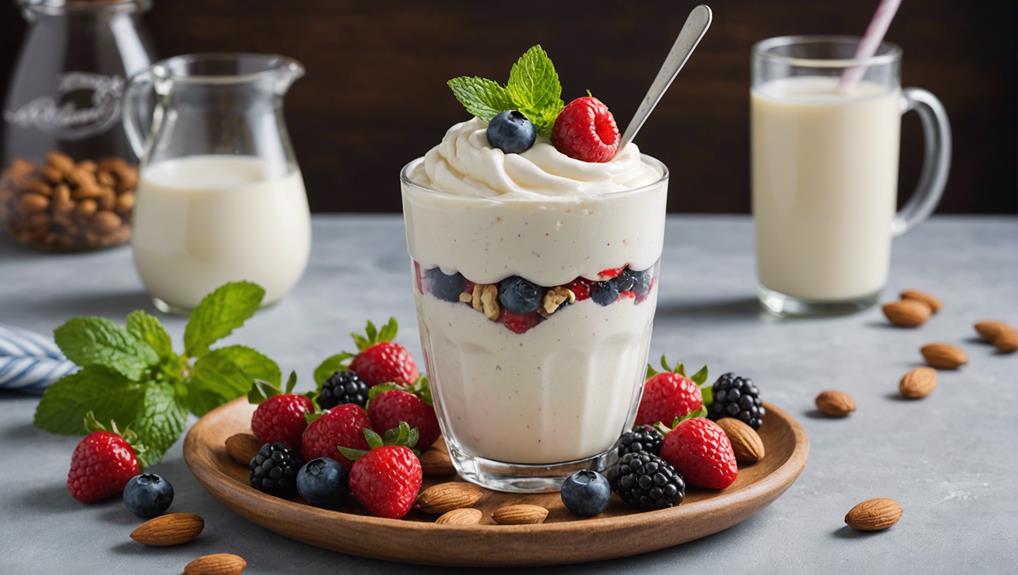Dairy-free frozen yogurt is an excellent option for individuals with lactose intolerance, as it guarantees a creamy texture without digestive discomfort. Made from plant-based milks like almond, coconut, or oat, these products not only eliminate lactose but also offer essential nutrients, including calcium and probiotics for gut health. Brands such as Pinkberry and Cocoyo have revolutionized this space, providing a variety of flavors tailored to both lactose-intolerant and health-conscious consumers. These alternatives can help maintain a balanced diet while delivering a satisfying treat. For more on homemade options and nutritional benefits, continue exploring.
Key Takeaways
- Dairy-free frozen yogurt offers a lactose-free dessert option suitable for those with lactose intolerance.
- It uses plant-based milk alternatives like coconut, almond, and oat milk, ensuring a creamy texture without digestive discomfort.
- Probiotics in dairy-free frozen yogurt support gut health and improved digestion for lactose-intolerant individuals.
- Popular brands like Pinkberry and Cocoyo provide a variety of vegan and probiotic-rich flavors.
- Homemade options allow for control over ingredients, ensuring a personalized, nutrient-rich, and lactose-free dessert.
Understanding Lactose Intolerance

Lactose intolerance, a common gastrointestinal condition, arises from the body's insufficient production of lactase enzyme, which is necessary for the proper digestion of lactose found in dairy products. This deficiency results in various uncomfortable symptoms including bloating, gas, cramps, and diarrhea after consuming lactose-containing foods. The severity of these symptoms can vary among individuals, necessitating personalized management strategies.
Effective management of lactose intolerance typically involves reducing or eliminating lactose intake. One viable approach is the use of lactose-free alternatives, which are now widely available in the market. Additionally, lactase enzyme supplements can be taken prior to consuming dairy to aid in lactose digestion, thereby alleviating symptoms.
Interestingly, some individuals with lactose intolerance may tolerate fermented dairy products like yogurt. These products contain active cultures that help break down lactose, potentially reducing the severity of symptoms. These active cultures, such as Lactobacillus acidophilus, contribute to the digestion of lactose, making fermented dairy products a suitable option for some individuals.
Despite the dietary restrictions, it is important to make sure that individuals with lactose intolerance maintain adequate nutrient intake, particularly calcium and vitamin D, which are abundant in dairy products but can also be sourced from fortified lactose-free alternatives.
Benefits of Dairy-Free Frozen Yogurt
Providing a lactose-free alternative, dairy-free frozen yogurt is a beneficial option for individuals with lactose intolerance due to its use of plant-based milk, which guarantees a creamy texture without causing digestive discomfort. This guarantees that lactose-intolerant individuals can enjoy a satisfying dessert without experiencing symptoms such as bloating and gas commonly associated with dairy consumption.
Dairy-free frozen yogurt often incorporates plant-based ingredients such as almond, soy, or coconut milk, which not only mimic the creamy consistency of traditional yogurt but also offer additional nutritional benefits. These plant-based options are often fortified with essential nutrients like calcium and vitamin D, making them a wholesome choice for maintaining bone health.
Moreover, dairy-free frozen yogurt frequently contains probiotics, beneficial bacteria that can aid in gut health and enhance digestion. These probiotics contribute to a balanced intestinal microbiota, which is essential for overall digestive health.
Popular Dairy-Free Brands

Several leading brands, such as Pinkberry and Cocoyo, have emerged in the market, offering dairy-free frozen yogurt that leverages plant-based milk alternatives to provide both nutritional benefits and exceptional taste. These brands cater to the growing number of lactose-intolerant and health-conscious consumers by utilizing coconut, almond, and oat milk to create their non-dairy frozen yogurt options.
The inclusion of plant-based options in frozen yogurt not only offers a creamy and flavorful alternative but also guarantees that individuals with lactose intolerance or those following a vegan diet can enjoy a variety of vegan flavors. For example, Pinkberry offers a range of dairy-free frozen yogurt flavors that maintain the rich, creamy texture expected from traditional frozen yogurt, while Cocoyo's offerings are known for their probiotic benefits derived from coconut milk.
Manufacturers of non-dairy frozen yogurt continue to innovate, bringing inclusivity and variety to the food industry. These efforts reflect a commitment to meeting the dietary needs of a diverse consumer base without compromising on taste or nutritional value. As a result, the market for non-dairy frozen yogurt is expanding, providing delicious and health-conscious options for everyone.
Plant-Based Milk Alternatives
Plant-based milk alternatives, such as coconut, almond, and oat milk, play a pivotal role in the formulation of dairy-free frozen yogurt by offering lactose-intolerant individuals a creamy and flavorful dessert option that closely mimics the texture and taste of traditional dairy products. These milk alternatives provide an essential base for creating lactose-free, dairy-free frozen yogurt that does not compromise on quality or sensory experience.
Coconut milk, with its naturally sweet taste, contributes to a rich flavor profile, making it a favored choice for many lactose-intolerant individuals seeking satisfying dairy-free dessert options. Almond milk, known for its nutty undertones, enhances the depth of flavor, while also maintaining a creamy texture that is important for the desired mouthfeel of frozen yogurt. Oat milk, recognized for its smooth consistency, offers another versatile option, ensuring that the final product is both palatable and nutritious.
The use of these plant-based milk alternatives in dairy-free frozen yogurt not only caters to the dietary needs of lactose-intolerant individuals but also aligns with a growing trend towards plant-based diets. This approach guarantees that consumers can enjoy a lactose-free, deliciously creamy frozen dessert without sacrificing taste or texture.
Homemade Frozen Yogurt Recipes

Creating homemade dairy-free frozen yogurt involves combining plant-based yogurt alternatives with frozen fruit and natural sweeteners to achieve a nutrient-rich, customizable dessert that meets dietary preferences and health needs. Utilizing yogurt substitutes such as coconut, almond, or oat milk provides a creamy base that is suitable for those with lactose intolerance or adhering to a dairy-free diet.
Homemade recipes typically require a food processor or blender to mix the ingredients to a smooth consistency. Frozen fruits like berries, mango, or bananas offer both flavor and texture, while natural sweeteners such as honey or agave syrup can enhance the taste without relying on refined sugars. The flexibility in ingredient choices allows for experimentation, leading to unique and personalized flavor profiles.
Additionally, making dairy-free frozen yogurt at home provides control over ingredient quality, enabling the use of organic produce and avoiding additives or preservatives commonly found in store-bought varieties. This method not only supports a healthier diet but also offers the satisfaction of creating a homemade treat tailored to individual taste preferences and dietary restrictions. Consequently, these recipes serve as an excellent option for those seeking nutritious, lactose-free dessert alternatives.
Nutritional Considerations
When considering dairy-free frozen yogurt, it is important to evaluate its nutrient content, particularly regarding calcium and vitamin D, which are essential for bone health. Additionally, examining sugar alternatives used in these products is vital to manage overall sugar intake. Finally, understanding the caloric impact of different plant-based milk options can help in making informed dietary choices.
Essential Nutrient Content
Dairy-free frozen yogurt offers an array of essential nutrients, such as calcium, protein, and vitamin D, through carefully selected plant-based ingredients, providing a viable alternative for those with lactose intolerance. Individuals who follow a dairy-free diet can still meet their nutritional needs without experiencing the digestive discomfort associated with lactose. Plant-based alternatives, including almond, soy, and coconut milk, are often fortified to replicate the nutritional benefits of traditional dairy products.
The key to ensuring that dairy-free frozen yogurt delivers these essential nutrients lies in reading labels attentively. Many commercially available options are fortified with calcium and vitamin D, compensating for the absence of these nutrients typically found in dairy. Protein content, derived from sources like soy or pea protein, also contributes to the nutritional profile of these products.
For individuals managing lactose intolerance, dairy-free frozen yogurt can be a nutritious and enjoyable option, aligning with their dietary needs while providing the essential nutrients required for overall health. By carefully selecting fortified plant-based alternatives, consumers can enjoy the nutritional benefits similar to those offered by traditional dairy products, thereby supporting a balanced and healthful diet.
Sugar Alternatives
Incorporating natural sugar alternatives such as stevia, monk fruit, and erythritol in dairy-free frozen yogurt can significantly enhance its nutritional profile by reducing sugar content and caloric intake. Stevia, derived from the Stevia rebaudiana plant, is a zero-calorie sweetener that provides a sweet taste without the glycemic impact of traditional sugar, making it an excellent choice for those managing lactose intolerance and blood sugar levels. Similarly, monk fruit extract offers sweetness without added calories, contributing to a healthier frozen yogurt option that caters to dietary restrictions and health-conscious consumers.
Erythritol, a sugar alcohol, further complements the nutritional benefits of lactose-free frozen yogurt. It is low in calories and does not cause spikes in blood sugar levels, enhancing its suitability for individuals seeking healthier dessert alternatives. These sugar alternatives also support weight management and may reduce the risk of metabolic disorders, aligning with the broader goals of nutritional health and wellness.
Caloric Impact
Considering the benefits of natural sugar alternatives, it is important to examine the caloric impact of dairy-free frozen yogurt to provide a thorough nutritional profile. Dairy-free frozen yogurt, particularly for individuals with lactose intolerance, presents a vital, often lower-calorie alternative to traditional dairy-based options. However, the caloric content can vary greatly depending on the brand and specific ingredients utilized.
Plant-based milk alternatives, such as almond or coconut milk, play an essential role in determining the caloric content of dairy-free frozen yogurt. Almond milk typically offers a lower calorie option compared to coconut milk, which is higher in fat and consequently, calories. Additionally, the inclusion of added sugars or sweeteners can significantly increase the overall caloric value of the product.
To cater to those seeking a healthier option, selecting dairy-free frozen yogurt made with natural sweeteners and whole food ingredients is advisable. These choices not only reduce the caloric content but also provide a more nutrient-dense option. For individuals with lactose intolerance, opting for products with fewer added sugars and more natural ingredients can ensure a satisfying yet lower-calorie treat, aligning with broader dietary goals.
Toppings and Pairings

Enhancing the nutritional value and taste of dairy-free frozen yogurt can be effectively achieved by incorporating a variety of fresh fruits, nuts, seeds, and other indulgent, lactose-free toppings. Fresh fruit toppings such as berries, mango, and pineapple not only add vibrant colors but also provide essential vitamins and antioxidants. Nut and seed toppings, including almonds, walnuts, and chia seeds, offer a satisfying crunch while contributing healthy fats, protein, and fiber.
For those seeking a more decadent experience, indulgent toppings like dairy-free chocolate chips, coconut flakes, and granola can elevate the flavor profile. Additionally, sweet additions such as agave nectar, maple syrup, and dairy-free caramel sauce can enhance the taste without introducing lactose. Dairy-free whipped cream, fruit purees, and dairy-free cookie crumbles present creative and luxurious options that cater to various preferences and dietary needs.
These toppings not only enrich the sensory experience but also boost the overall nutritional quality of the dessert. By carefully selecting a combination of these diverse and nutrient-rich toppings, individuals can enjoy a customized and healthful dairy-free frozen yogurt that meets their dietary requirements without compromising on flavor or enjoyment.
Health Benefits
Dairy-free frozen yogurt offers notable health benefits, including the support of probiotic gut health through the inclusion of active cultures, which can enhance digestive function. Additionally, many dairy-free varieties are low-calorie, providing a nutritious yet satisfying option for those mindful of their caloric intake. These attributes make dairy-free frozen yogurt a valuable choice for promoting overall wellness while adhering to dietary restrictions.
Probiotic Gut Health
Probiotics found in dairy-free frozen yogurt play an important role in promoting a healthy gut microbiome by encouraging the growth of beneficial bacteria. For individuals with lactose intolerance, dairy-free options provide a viable way to enjoy the health benefits of probiotics without the discomfort associated with lactose. Probiotics are known to aid in digestion, helping to break down food more effectively and facilitating the absorption of essential nutrients. This can be particularly helpful for those who struggle with digestive issues due to lactose intolerance.
Additionally, the beneficial bacteria in dairy-free frozen yogurt contribute to maintaining a balanced gut flora, which is essential for overall digestive health. An imbalance in gut flora can lead to various gastrointestinal issues, but regular consumption of probiotics helps prevent this. Beyond digestion, probiotics have been shown to enhance immune function by reducing inflammation in the gut. This is significant because a well-functioning immune system is essential for protecting the body against pathogens and illnesses.
Incorporating dairy-free frozen yogurt into a regular diet can therefore support both gut health and immune function, making it a valuable addition for those seeking to improve their overall well-being.
Low-Calorie Option
Opting for dairy-free frozen yogurt as a low-calorie treat offers a nutrient-dense alternative that supports weight management and overall health. For individuals with lactose intolerance, this choice eliminates digestive discomfort while providing a guilt-free treat. The utilization of plant-based milk alternatives in dairy-free frozen yogurt guarantees that it remains lower in calories compared to traditional dairy options, yet still rich in essential nutrients.
This low-calorie option is particularly beneficial for those pursuing a healthy lifestyle. The incorporation of ingredients such as almond milk, coconut milk, or soy milk not only caters to dietary restrictions but also aids in digestive wellness. These plant-based milk alternatives are often fortified with vitamins and minerals, making dairy-free frozen yogurt a wholesome choice without compromising on taste or texture.
Moreover, the creamy consistency and satisfying taste of dairy-free frozen yogurt make it an enjoyable addition to a balanced diet. By choosing this low-calorie option, individuals can effectively manage their weight while reaping the health benefits associated with a nutrient-dense diet. Dairy-free frozen yogurt emerges as an excellent choice for those with lactose intolerance, supporting both digestive health and overall well-being.
Frequently Asked Questions
Can I Have Frozen Yogurt if I'm Lactose Intolerant?
Yes, lactose intolerant individuals can enjoy frozen yogurt by opting for yogurt alternatives made from plant-based snacks. These options help avoid lactose symptoms, provide calcium sources, offer probiotic benefits, and can be included in various dessert recipes.
Is There Lactose Free Frozen Yogurt?
Yes, there are lactose-free frozen yogurt options available. These include varieties made from coconut milk, almond base, cashew alternatives, soy yogurt, and fruit sorbet, providing plant-based options and dairy substitutes for lactose-intolerant individuals.
Is Dairy-Free Safe for Lactose Intolerance?
Approximately 65% of the global population experiences some degree of lactose intolerance. Plant-based alternatives such as almond, coconut, and oat milk serve as excellent yogurt substitutes, providing lactose-free, vegan options that support digestive health and offer probiotic benefits.
Is Non Dairy Ice Cream Good for Lactose Intolerance?
Non-dairy ice cream is beneficial for lactose intolerance, utilizing ingredients substitution like nut milk, coconut cream, and almond yogurt. Plant-based options and sorbet alternatives provide diverse, nutrient-dense choices, bypassing lactase enzyme requirements and preventing symptoms.
Conclusion
To sum up, dairy-free frozen yogurt emerges as a viable alternative for individuals with lactose intolerance, offering both nutritional benefits and diverse flavor options. Plant-based milk alternatives serve as the backbone of these products, providing essential nutrients while catering to dietary restrictions. Additionally, the availability of commercial brands and homemade recipes guarantees accessibility and customization. As the saying goes, 'variety is the spice of life,' and the array of toppings and pairings further enhances the health benefits and enjoyment of dairy-free frozen yogurt.







